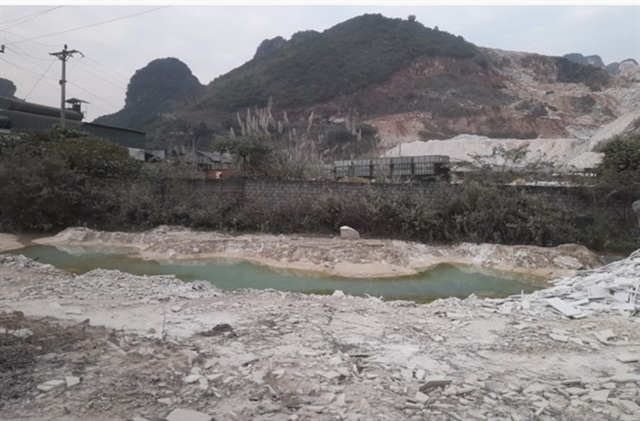 Environment
Environment

 |
| Wastewater is discharged by Yên Lâm Stone Village in Yên Định District of Thanh Hoá Province. — VNA/VNS Photo |
HÀ NỘI — Agencies have carried out more than 3,000 inspections over the last decade, sanctioning administrative violations on water resources to the tune of VNĐ15 trillion (US$630.8 million).
According to the Deputy Director of the Water Resource Management Department Nguyễn Minh Khuyến, more than 24,000 projects of water use and wastewater discharge were managed from central to local levels through a licensing tool.
However, the reality shows that violations in the field of water resources are still common.
According to the department’s reports, in the past 10 years, central-level agencies alone carried out 31 inspections conducted in 206 establishments involving water use and wastewater discharge in 40 cities and provinces nationwide and collected fines of more than VNĐ15 trillion.
Through the inspections, the authorities have prevented violations of water exploitation and use such as unlicensed discharge, over-exploiting and lack of monitoring.
In addition, through an online automatic monitoring system, the Ministry of Natural Resources and Environment has also asked localities to sanction hundreds of violations related to the exploitation and use of water.
According to data reported by 63 provinces and cities, in the past 10 years, localities have carried out nearly 3,000 inspections at 19,000 establishments of exploitation and use of water resources and wastewater discharge detecting and handling more than 1,500 cases of administrative violations with total fines of nearly VNĐ59 billion (US$2.47 million).
Khuyến said that the main reason was overlaps and inconsistencies in legal regulations and the scope of management responsibilities between the water resources sector and related specialised field sectors.
The information system and database on water resource management were also incomplete and awareness of authorities, organisations and people about the role of water resources and the enforcement of the Law on Water Resources was still limited, said Khuyến.
Meanwhile, investment resources for developing the water sector were mainly from the State budget due to a lack of ability to approach the private sector and the value of water resources had not been adequately calculated, he said.
In addition, water resource planning had been implemented slowly and had not been able to meet the requirements of the public and businesses, while watershed forests were declining and the protection of aquatic resources had not been given enough attention and investment, he said.
“Việt Nam needs to move towards national water resource governance using digital solutions and integrate regulations on water management in the Law on Water Resources,” he said.
Initially, the department proposes the Government assign tasks to review legal documents, ordinances and resolutions so as to recommend to the National Assembly to amend legal documents to ensure consistency and avoid overlapping.
The next tasks and solutions are to complete institutions, policies and financial mechanisms of the water sector in the direction of smart governance to attract investment and develop the sector in a sustainable way.
The country needs to cooperate with countries sharing the water sources in sharing and monitoring information and data, exploiting water resources, improving and restoring degraded, depleted and polluted rivers, protecting water sources and sustainably developing aquatic resources and important wetland ecosystems. —VNS




